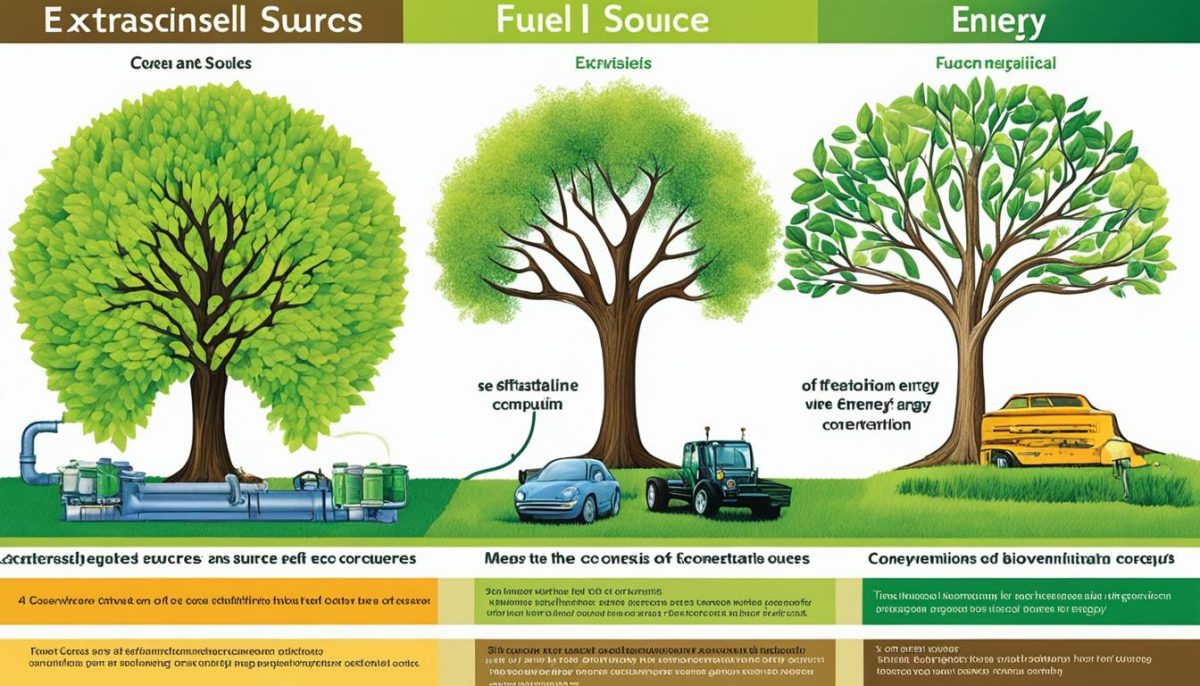Welcome to our informative article where we explore the fascinating world of biofuels and alternative fuels. In this section, we will shed light on the key distinctions between these two types of fuel sources.
With the growing concerns about climate change and the need for more sustainable energy solutions, both biofuels and alternative fuels have emerged as promising alternatives to traditional fossil fuels. Understanding their differences is crucial in navigating the rapidly evolving energy landscape.
While the terms “biofuels” and “alternative fuels” are often used interchangeably, they are not entirely synonymous. Biofuels refer to fuels derived from biomass, which includes organic materials such as plants, crops, and waste. On the other hand, alternative fuels encompass a broader category of non-petroleum-based fuels that can include sources like hydrogen, natural gas, and electricity.
Both biofuels and alternative fuels offer significant environmental benefits compared to traditional fossil fuels. They are renewable and have lower emissions, contributing to reduced greenhouse gas emissions. Moreover, they can potentially reduce our dependence on finite and polluting sources of energy.
However, the differences between biofuels and alternative fuels lie in their composition, sources, and availability. Biofuels are typically derived from plant-based materials and are classified into various types, such as biodiesel and ethanol. Alternative fuels, on the other hand, are sourced from a diverse range of options, each with its own advantages and challenges.
Join us as we embark on a journey to explore the world of biofuels, their production processes, and the various types of alternative fuels. By the end of this article, you’ll have a clear understanding of the distinctions between these two fuel sources, empowering you to make informed decisions about your energy choices.
Understanding Biofuels
Biofuels are a form of renewable energy that provide a sustainable alternative to traditional fossil fuels. They are derived from organic materials known as feedstocks, which can include crops, agricultural waste, and even algae. The production process typically involves converting these feedstocks into usable fuel through various methods such as fermentation, distillation, and chemical processes.
One of the key advantages of biofuels is their ability to reduce greenhouse gas emissions compared to conventional fossil fuels. When biofuels are burned, they release carbon dioxide, but the plants used to produce them absorb carbon dioxide during their growth, resulting in a potentially neutral carbon footprint.
Biofuels can be categorized into different types based on their composition and sources. Biodiesel, for example, is produced from crops like soybeans or recycled cooking oil, and it can be used as a substitute for diesel fuel. Ethanol, on the other hand, is derived mainly from corn and sugarcane and is commonly mixed with gasoline to create a biofuel blend.
It is important to note that while biofuels offer many benefits, there are also some considerations to keep in mind. The production of biofuels requires a significant amount of land, water, and energy, which can sometimes lead to competition with food crops or have negative environmental impacts. Additionally, the availability and accessibility of biofuel sources can vary depending on geographical factors and technological advancements.
Advantages of Biofuels:
- Renewable and sustainable energy source
- Reduces greenhouse gas emissions
- Potentially neutral carbon footprint
- Can be produced from various organic materials
Disadvantages of Biofuels:
- Requires significant land, water, and energy resources
- Potential competition with food crops
- Possible negative environmental impacts
- Availability varies depending on location and technology
Overall, biofuels play a crucial role in the transition to a more sustainable energy future. By understanding their origins, production process, and sources of raw materials, we can better appreciate the impact and potential of biofuels as a renewable energy source.

Exploring Alternative Fuels
As we continue our exploration of sustainable energy alternatives, let’s shift our focus to alternative fuels. These fuels offer a viable solution to reduce our dependency on non-renewable energy sources and pave the way towards a cleaner and greener future.
Alternative fuels encompass a wide range of non-petroleum-based options that can be used in transportation, heating, and power generation. Some of the most prominent alternative fuel sources include hydrogen, natural gas, and electricity.
Hydrogen, often referred to as the fuel of the future, is a versatile and clean-burning fuel that can be produced from renewable sources. When used in fuel cells, hydrogen combines with oxygen to generate electricity, emitting only water vapor as a byproduct. This makes it an excellent sustainable option for transportation and energy production.
Natural gas, another alternative fuel, offers several advantages over traditional gasoline or diesel. It produces significantly fewer greenhouse gas emissions, improving air quality and reducing carbon footprints. Natural gas is widely available and can be used in various applications, such as compressed natural gas (CNG) vehicles and natural gas power plants.
Electricity, generated from renewable sources such as solar or wind, is becoming increasingly popular as an alternative fuel for vehicles. Electric vehicles (EVs) have gained traction worldwide due to their zero tailpipe emissions and lower operating costs. With advancements in battery technology and charging infrastructure, electric vehicles are paving the way towards a sustainable transportation future.
While alternative fuels offer numerous benefits, there are also challenges that need to be addressed. Infrastructure development, availability of fueling stations, and the initial investment required for transitioning to alternative fuels are among the key considerations. However, with concerted efforts from governments, organizations, and individuals, these challenges can be overcome.
“Alternative fuels provide a sustainable path towards reducing our reliance on non-renewable energy sources,” says Dr. Emily Anderson, a leading expert in energy sustainability. “By embracing alternative fuels, we can significantly reduce greenhouse gas emissions and create a more sustainable energy landscape.”
As we continue our journey, the next section will focus on comparing biofuels and alternative fuels, highlighting their similarities and differences. Stay tuned for insightful analysis and valuable recommendations.
Comparing Biofuels and Alternative Fuels
When evaluating the energy landscape and sustainable options, it is important to understand the comparison, similarities, and contrasts between biofuels and alternative fuels. Despite both being renewable energy sources, they differ in terms of their composition, production process, and environmental impact.
While biofuels are derived from organic matter, such as plant oils and animal fats, alternative fuels encompass a broader spectrum of non-petroleum-based options, including hydrogen, natural gas, and electricity. The production of biofuels involves converting these organic materials through processes such as fermentation or transesterification. On the other hand, alternative fuels are typically obtained from sources like water electrolysis, natural gas extraction, or renewable energy generation.
When considering their impact on the environment, biofuels and alternative fuels also demonstrate distinct characteristics. Biofuels are known to reduce greenhouse gas emissions compared to conventional fossil fuels, thanks to the absorption of carbon dioxide by the feedstock during growth. Meanwhile, alternative fuels like hydrogen and electricity offer the potential for zero emissions at the point of use, further contributing to a cleaner energy future.
Although both biofuels and alternative fuels offer promising sustainable solutions, their comparison extends beyond environmental factors. The availability of infrastructure is a crucial consideration. Biofuel production heavily relies on established agricultural and processing facilities, while alternative fuels require specialized fueling stations and charging points for widespread adoption. Additionally, economic viability plays a significant role in determining the feasibility of these fuels, with factors such as feedstock availability, production costs, and market demand influencing their competitiveness in the energy market.

